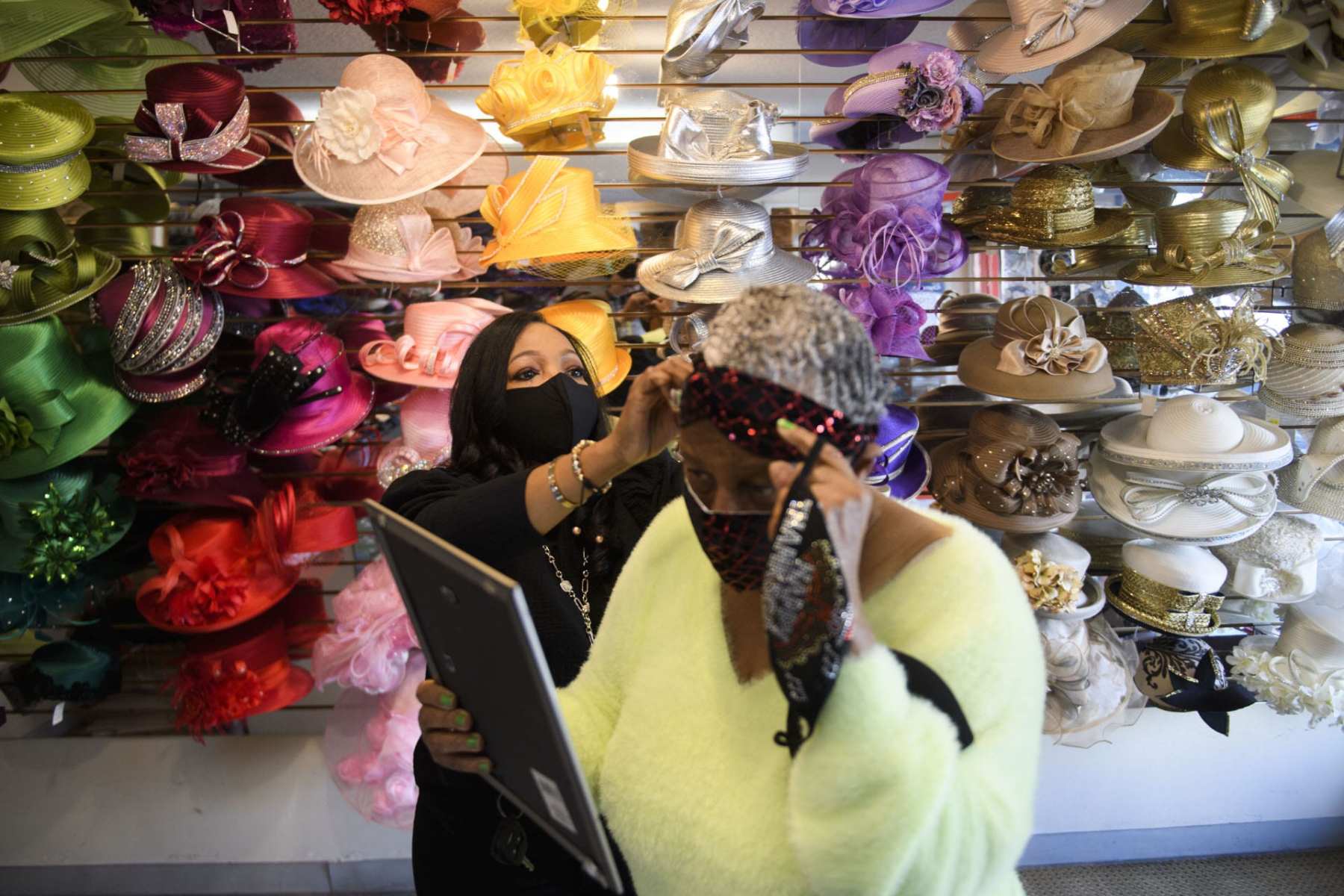Marcelle Folk thought 2020 was going to be her year. For nearly four years, she had been catering in-person events and mobile bartending from her van, in addition to her full-time federal job as a paralegal in Washington, D.C. The revenue from her catering business had tripled three years in a row, to the point that Folk in February 2020 could quit her job at the Department of Veterans Affairs.
Less than one month later, the world shut down.
“I definitely lost faith almost every night — thinking my business was going to close down for good,” Folk said. “It was that feeling of drowning and I don’t know if I’m going to survive. We personally faced eviction three times. I had thought of moving myself, my teenage daughter and my grandmother into a storage unit. I thought we were going to be homeless.”
The government’s signature small-business pandemic aid package, the Paycheck Protection Program, has been allotted $796 billion in loan funding, but funds are dwindling. Only businesses that were generating revenue before the pandemic are eligible for this aid. A recent survey conducted by the National Association of Women Business Owners and Gusto, a payroll and benefits platform, found that many women business owners have been left out — partly because the program does not help the large number of businesses that were started out of necessity as a result of the pandemic.
PPP was created by Congress in March 2020 to help businesses offset losses and encourage them to retain employees. Sole proprietors, independent contractors and self-employed people could access the program only through a set of rules that tied how much they got to whether the business was profitable. Businesses without employees — many cleaning services, Uber drivers, consultants, beauticians — are overwhelmingly owned by women and people of color. About 90 percent of women-owned businesses have no employees other than the owner.
The American Rescue Plan, which passed in March 2021, provided an additional $7.25 billion to the program and extended its expiration date to the end of May. As of April 18, nearly 10 million PPP loans have been approved, with more than $762 billion dispersed.
Luke Pardue, an economist at Gusto and doctoral candidate at the University of Maryland, said experts have long been sounding the alarm on the ways Black and Latinx women and small-business owners have been disproportionately impacted by COVID-19. But there’s been less attention on the “huge spike” in new businesses this past year, particularly in the e-commerce sector, said Pardue, who authored the report. According to the survey of about 1,200 women business owners, nearly half of these new businesses started during the pandemic were started by women of color; they were more than twice as likely to have started their business out of economic need.
“When we initially saw these results, it was very surprising,” said Pardue. “Minority business owners make up about 27 percent of all businesses. They are the most underrepresented population among business owners. It’s eye-popping the way they’ve taken obstacles and been able to adapt.”
Small businesses have disproportionately received less federal support than other businesses. And women tend to receive the least amount of aid because government funding often relies on relationships with big banks and institutions, which have historically turned down loan requests from women of color at twice the rate as White men.
Lyda Bigelow, an associate professor of entrepreneurship and strategy at the University of Utah, said even before COVID, there was a “huge surge” in the number of minority women-owned businesses. In 2018, women of color were starting businesses at about twice the rate of White women. This momentum continued, she said, and then the pandemic hit and disproportionately battered communities of color. From child care needs to the threat of eviction and access to paid leave, unemployment levels, mortality rates — women of color bore the brunt of the crisis.
Noting that many of the new women-owned businesses were created out of necessity, have no connection to lines of credit and lack the capital needed to grow — Bigelow said she is concerned about the longevity of these companies as the country’s economy recovers.
“All of us in economics and strategy are predicting an enormous surge in economic activity due to pent-up demand,” Bigelow said. “That means larger, more established businesses with easier access to capital are going to be able to expand their services and steal customers from these smaller businesses.”
Folk, who is Latinx, said her business has now become more of a wine, spirits and cocktail gift box delivery that also does virtual events. Since the pandemic hit, she started volunteering as a business mentor, got a temporary job with the Small Business Administration and received a real estate license. Folk works seven days a week, and she said her business is doing just enough to stay afloat and pay for the van.
“We haven’t had a grocery budget in months,” Folk said. “My daughter and I had a game: how long can we go without grocery shopping? We would just eat what we have. I came across a channel that taught people how to eat like they did in the Great Depression. We survived off of potatoes, onions, hot dogs and eggs for a long time.”
Folk said more and more people are starting businesses because they don’t know what else to do.
“We’re going back to the days of trading with each other,” Folk said. “I’ve paid for IT services with whiskey. I don’t have insurance, but I gave an eye doctor a bottle of wine after she looked at a picture of my daughter’s eye and told us how to fix it.”
Ashlie Ordonez, the owner of a waxing studio in Denver who identifies as Latinx and Native American, said she hasn’t been able to qualify for the Paycheck Protection Program despite filing paperwork to become an LLC in January 2020 — a month before the February 15 deadline. After applying for aid twice, Ordonez was told she “didn’t suffer economic downfall” because her business didn’t have any revenue before the deadline.
By the time the pandemic caused mass business closures, Ordonez had already signed the lease for studio space and hired a staff of seven women. She had saved money for several years, sold her family home and invested $150,000 towards the business.
“Hearing the government tell me that I didn’t suffer was a huge blow,” said Ordonez, a mother of five children in elementary and middle schools.
After the first rounds of coronavirus relief shut out many small businesses owned by women and people of color, President Joe Biden’s administration announced changes in February to the forgivable business loan program to ensure that minority communities had better access. However, women owners are also more risk averse than their male counterparts. A lot of the pandemic relief for businesses is in the form of forgivable loans, and that requires the owner to have faith that they won’t have to pay the loan. Bigelow said that the government’s response was “robust and swift” but that the government should not rely on programs like PPP that depend on traditional, large financial institutions.
Linda Edelman, a professor and chair of the management department at Bentley University, said one of the biggest problems for women entrepreneurs is getting seed money. Women of color get about 0.2 percent of venture capital funding, Edelman said, which makes it nearly impossible for these business owners to compete in the commercial market.
“Despite having challenges when it comes to education, funding, opportunities and networks — it’s amazing to me that there’s still this quiet revolution of women of color in this space,” Edelman said. “It’s a wonderful thing: the resilience we see in these women.”
Ordonez — who also wrote about her experience in a CNN opinion piece — was forced to postpone the grand opening of Bar Bare, her dream studio, by a couple months. She also had to let her staff go because clientele were not coming. And then her landlord raised her rent twice, increasing the monthly payment by a total of $600.
“We just kept getting hit after hit after hit,” Ordonez said. “We burned through our savings fast, and I had to make a hard decision of selling my wedding ring in December to keep the studio open. We had already sold our home, and the ring was the last valuable thing we had.”
When the stimulus money came in, Ordonez said those funds went straight into the business account to keep it going a little longer.
“Some days I’m positive, and some days I feel like I’m drowning and trying to breathe in the ocean through a straw,” Ordonez said. “I’m literally month to month. My cash reserve is gone. I’m at the will of people just being kind to me, just giving me a hand out.”
Chabeli Carrazana contributed to this report.






